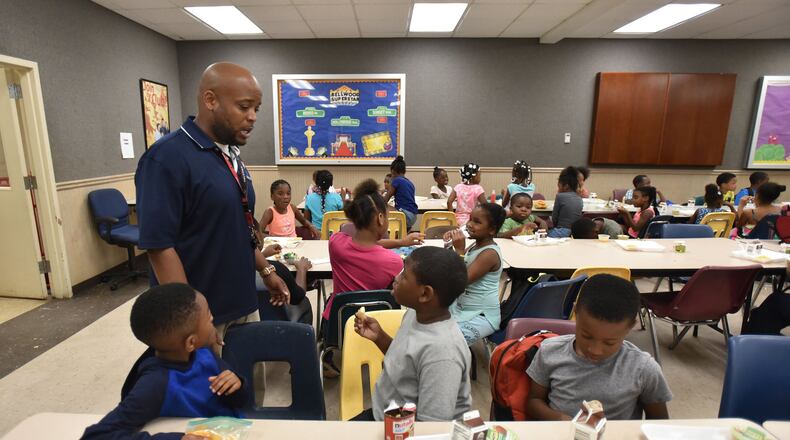Nearly 141,000 children in Georgia would go hungry over the summer if not for a free meal program.
Through the U.S. Department of Agriculture’s Summer Food Service Program, sponsoring organizations provide sites such as daycare facilities, churches and community centers with meals for children who normally rely on free or reduced lunch during the school year. The sponsors are then reimbursed with federal funds.
In Georgia, the program has roughly 100 organizations sponsoring 2,300 sites across the state.
One of these sites in the Salvation Army Bellwood Boys and Girls Club, which, with the help of its sponsor, One 2 One Educational Support, Inc, feeds close to 120 kids every day.
Credit: HYOSUB SHIN / AJC
Credit: HYOSUB SHIN / AJC
“The Bluff is known for being poverty-striken,” said Kevin Johnson, the unit director for Bellwood, referring to the area near English Avenue in Atlanta. “The parents are grateful, especially for the hot meals. We normally just get cold meals from the city.”
The older children play around in the gym or out back in the field while the younger children go upstairs to eat a lunch of cheese calzones and buttered corn on this day. When the younger children finish, the age groups will switch places.
Because of the sponsorship, Bellwood is able to provide its children with breakfast and lunch. That wasn’t the case two years ago.
The partnership between Bellwood and One 2 One actually started three years ago when Johnson was searching for a way to provide snacks for the after-school program.
“The kids were really hungry after school,” he said.
During a training session in Augusta, Johnson met with the Food Bank, who forwarded him on to Rita Williams, the CEO of One 2 One.
After a successful year of after-school snacks, Johnson asked Williams to help fund its summer meals.
Williams has experience herself with serving children. A former teacher, Williams used to run a meal site for a year before deciding her organization could contribute better as a sponsor.
“The [federal] regulations are so high for people to adequately serve kids that a lot of sponsors can’t make it,” she said. As a result, there was a high demand for sponsor organizations.
Williams’ organization provides training for the sites on how to properly serve the meals, as well as deals with making sure the meals are nutritionally correct and arrive on time. Site operators keep track of how many meals they have served, and submit claims to Williams weekly, who then sumbits reimbursement claims to the state monthly.
“That’s a blessing to us that we don’t have to worry about the finances,” Johnson said. “We just have to count the meals.”
Once she made the switch, Williams immediately received calls asking for her help.
“I didn’t know that it was a huge need at the time,” she said.
Participation seems to be growing, with Williams receiving more requests every year.
She added partnerships every year, to the point she had to make a public bid for a food vendor to handle the demand.
One 2 One now sponsors 23 sites, inlcuding Bellwood, each serving between 35 and 250 kids every day, she said.
However, despite the rise in the number of children receiving summer meals, some organizations are concerned about the number that aren’t.
The 141,000 children that participated in 2016 make up only a fraction of the nearly 880,000 children that qualify for free or reduced lunch. And in recent years, the growth pace of the summer program has lagged behind the growth in eligibility.
That got non-profits like No Kid Hungry involved.
“We want to make sure all kids have the food they need to thrive,” said Derrick Lambert, program manager at the organization’s center for best practices. “Our main goal this time of year is to raise awareness of the availability of summer meals.”
To assist in connecting families with food sites, No Kid Hungry established a texting hotline in 2013. By texting the word “FOOD” or “COMIDA” to 877-877, parents can find summer meal sites near them.
Though the tool has been around for five years, it has gone viral on social media this year in particular.
“We’ve seen a huge uptick this summer,” Lambert said. “For perspective, we’ve gotten more texts this summer than the last four summers combined.”
He said posts on social media platforms have helped get the word to those who need the program.
“I think there’s a broad awareness that there’s a gap in free lunch participation in the summer,” he said. “People sharing the information on social media, in storefronts, in the community helps let others that these meals are available.”
Lambert said the organization hopes the increased volume of texts translates to more children involved in the summer food program.
About the Author
Keep Reading
The Latest
Featured




